As 2024 draws to a close, we’re looking back at some of our best Red Sofa interviews from this year, where we spoke to experts across the globe about automotive logistics and strategies for success in the supply chain.
Scaling sustainable automotive logistics: JLR’s green initiatives with Levent Yuksel
Back in March, we spoke to Levent Yuksel, freight operations director at JLR at Automotive Logistics & Supply Chain Europe in Bonn, Germany. Yuksel stressed the importance of partnerships between logistics providers, suppliers and OEMs in reducing emissions and improving sustainability across the automotive supply chain.
“The key thing is that the more we understand each other, the more we stay close to each other and share the objectives that we want to achieve, the more we have a better understanding, and ideas come to the surface,” Yuksel said.
He added that in order to scale green automotive logistics, the industry needs support from governments, as the infrastructure to support the transition to electrification is not yet there. He said the best enabler for scaling electrification is for government bodies to enable funding and prioritise open access locations for refuelling and charging equipment.
Jump to:
Volkswagen Group’s Anu Goel on increasing capacity and transparency in FVL
Nissan’s Gerardo de la Torre on cyber security and digital action plans for automotive supply chains
GM’s Jeff Morrison on deepening partnerships with suppliers
Toyota México’s Lizette Gracida on Toyota’s path to nearshoring success in Mexico
BMW’s Carolin Richter on the OEM’s humanoid robots redefining automotive logistics
“If the infrastructure is not there, we can’t move on,” he said. “It’s a massive investment, but I think we are generating understanding and advocating the message that we all have to bear our responsibilities and share in this journey.”
Yuksel, who will be reappearing as a speaker at ALSC Europe in 2025, spoke more about JLR’s strategic shift towards a carbon-free future, part of the OEM’s Reimagine Strategy, earlier in the year. “It’s proving difficult, but I’m not giving up,” he said.
Read the full interview with Levent Yuksel, JLR here
Yuksel also hosted a workshop at ALSC Europe 2024, which we followed up on in September. In the follow up, we looked at what needs to be done next ahead of the 2025 event, with insights from Yuksel and Anouck Arnaud, director of worldwide transport logistics, Mercedes-Benz Group. Read more on that here.
Enhancing finished vehicle logistics: Volkswagen Group’s capacity and transparency solutions with Anu Goel
Anu Goel, executive vice-president, Group After Sales & Service, Volkswagen Group sat down on the Red Sofa in June to discuss bringing together VW North America’s US, Canada and Mexico vehicle logistics divisions under a Virtual Task Force.
The aim, he explained, was to explore more opportunities that are beneficial for the region as a whole, aligning on KPIs while sharing data and information across the subdivisions of the group and ensuring systems transparency.
“We previously thought of our network as individual countries, but when you look at our ports, our rail systems, our trucking, everything, they are interrelated,” he said. “So decisions that would be made in one country had knock-on effects elsewhere with our network.”
The move will be especially beneficial moving into 2025, as president-elect Donald Trump has threatened to impose tariffs on Mexican and Canadian imports, having a knock-on effect on the whole North American supply chain.
Read more: Volkswagen Group’s North America vehicle logistics approach saves cost and delivery time
Goel, who spoke at Finished Vehicle Logistics North America in 2024, will be returning to the stage in April at Huntington Beach, California.
Strengthening cybersecurity in supply chains: Nissan’s digital action plans with Gerardo de la Torre
We held our first ever Automotive Logistics & Supply Chain Digital Strategies North America event in Nashville this year, where keynote speaker Gerardo de la Torre took to the Red Sofa to talk about Nissan’s digitalisation strategy and its next steps.
De la Torre, regional senior director, Supply Chain Management (SCM) USA & Mexico, Nissan Group of North America said that new legislations and compliance requirements are further driving the need for digitalisation.
“The old supply chain mindset only started from tier one, but now we have all new legislation and requirements and a need for understanding where raw materials are coming from,” he said. “We have spent more than a year developing digital tools to enable significant efficiencies to our suppliers and to see how they are corresponding to the requirements. We can demonstrate that we comply.”
Nissan Group of North America has been restructuring to prioritise integrated digitalisation across its business units, focusing on improving visibility and data analytics while remaining compliant and cyber-secure. De la Torre said it was “absolutely necessary” to change the structure of the group to enable faster growing digitalisation and innovative solutions, and part of this involves focusing on talent within the company.
Read more: Gerardo de la Torre on Nissan’s ‘absolutely necessary’ digital shift
“A key pillar is people and targeted development, finding and allocating the right talent,” he said. “We created several new positions in our organisation as part of our strategy, including a new supply chain compliance manager, going in a very good way. Also, we created a cyber security department, from tier-n all the way to manufacturing and delivering to the customer.”
De la Torre will be returning to Nashville for our second ever ALSC Digital Strategies North America conference in June 2025.
Building stronger supplier partnerships: GM’s strategic supply chain approach with Jeff Morrison
GM’s senior vice-president of global purchasing and supply chain, Jeff Morrison, spoke to Automotive Logistics in October about the company’s strategic shift towards electrification at ALSC Global in Dearborn, Michigan.
Morrison said that one of the biggest lessons GM has learned is the need to go deeper into its value chains. “We’ve always worked closely with our tier-one suppliers, but today, we need to extend those partnerships even further,” he said. “Semiconductors are a clear example where we’ve had to build more direct relationships, even going back to the source of raw materials.”
He stressed that electrification demands a similar approach. “We are forming partnerships that stretch all the way back to the mines where battery-grade materials are sourced,” he said. “It’s no longer just about securing supply – it’s about ensuring the quality and sustainability of those supplies.”
Read the full transcript from the Red Sofa interview here
In 2024, a year where OEMs and logistics providers have faced increasing cost pressures, GM has been strengthening its supplier relations, nearshoring strategies, and digital strategies, to enable the carmaker to enhance its supply chain resilience across North America.
At ALSC Global, Morrison asked for preference from suppliers in return. “If you were to compare and contrast other OEMs with GM, there is a definite difference in terms of how we manage [relationships]. One of the things that I ask for in return, because nothing is free, is preference,” Morrison said. “As you’re allocating capacity out, please do not forget your anchor partners. Please give us the preference that I think we have earned over this amount of time, and I promise you, if you don’t give us that preference, we will probably not forget that either.”
Read more: Knowing where to be lean and where to be robust in GM’s supply chain
Nearshoring success in Mexico: Toyota’s supply chain leadership with Lizette Gracida
Lizette Gracida, senior director of external affairs and trade compliance at Toyota México, has been deep in Toyota’s nearshoring strategy. At ALSC Mexico in November, she explained how the OEM’s $1.4 billion investment is helping pave the way for Mexico to become a leader in nearshoring and sustainable logistics.
While nearshoring is not a new trend for Mexico or the automotive industry, the geopolitical situation in North America and levels of foreign investment in the country are driving the trend further than before.
Looking ahead to Trump’s inauguration in 2025, the future of the United States-Mexico-Canada free trade agreement (USMCA) and beyond, Gracida said there is a lot of uncertainty. With the USMCA up for review in 2026, and Trump’s proposed tariffs already threatening the agreement, Gracida said Toyota México’s partners are looking for alignment in terms of trade policy.
“Mexico needs to make sure that all OEMs that are established in the country are complying with the USMCA,” she said.
She added that the “spirit of the USMCA” is about localising and strengthening the supply chain, and said the automotive logistics industry should continue in that path.
Read more: Mexico will retailate against Trump’s tariffs, says international trade expert
Revolutionising automotive logistics: BMW’s use of humanoid robots and advanced automation with Carolin Richter
We wrapped a year of global conferences up in Munich in December, at ALSC Digital Strategies in Europe, where BMW’s Carolin Richter spoke about humanoid and multi-purpose robots capable of automating intricate logistics tasks that were previously deemed impossible.
As BMW’s head of next generation robotics, Richter explained how advancements in generative AI are driving a paradigm shift in robotics. In logistics, they hold immense potential, particularly for last-mile handling and complex picking tasks that demand dexterity and adaptability.
Richter said there is research happening on how humanoids can be connected to generative AI and what the best learning methods might be. “I don’t think the world knows yet what is really needed to train such a robotic foundation model, we just know it’s a lot of data,” she said. “That is why most of the robotic components at the moment work with terabytes of raw unlabeled data. I think this area where I’m most interested in, in the further development of those humanoids.”
BMW plans to deploy its first humanoid robots at its Leipzig plant early next year, marking a significant milestone in the journey towards intelligent, scalable automation in logistics and production.
Of course, Trump’s upcoming presidential term in the US in 2025 will undoubtedly affect legislation and development of autonomous robotics and generative AI in the US, which could impact the industry globally. So automotive logistics will have to prepare for regulations – or lack thereof – in the coming future.
Read more: BMW using cloud control system to manage AGVs in Regensburg
To view all of our Red Sofa interviews from 2024 and beyond, visit our Red Sofa page here.
Topics
- BMW
- Cross-Border Logistics
- Cybersecurity
- Data Integration & Interoperability
- Digitalisation
- Editor's pick
- Electric Vehicles
- features
- Finished Vehicle Logistics
- GM
- Inbound Logistics
- Interviews
- JLR
- Kaizen & Continuous Improvement
- Lean Logistics
- Lean Transformation
- Logistics Automation
- Logistics IT
- Nearshoring
- Nearshoring Strategies
- Nissan
- OEMs
- People
- Policy and regulation
- Ports and processors
- Shipping
- Supplier Diversification
- Supply Chain Planning
- Sustainability
- Toyota
- Trade & Customs
- Video
- Video interviews
- Volkswagen


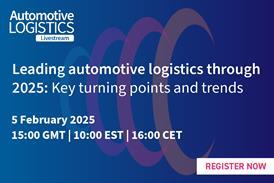

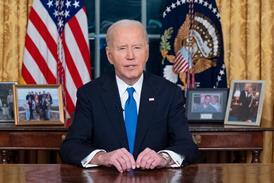
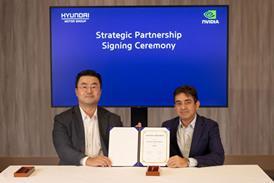



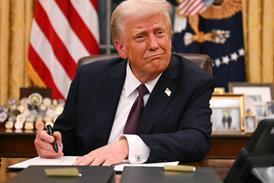
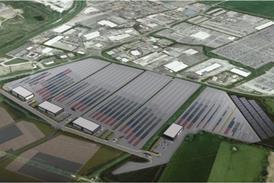


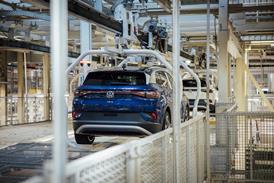


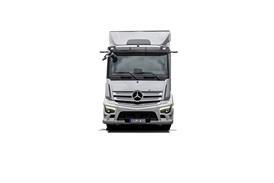
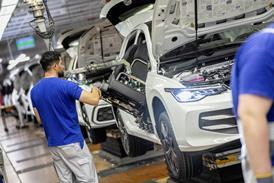
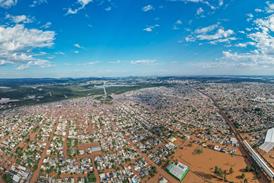
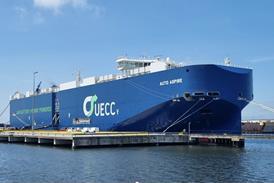
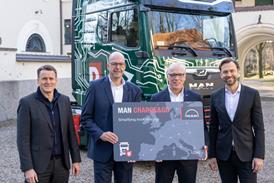

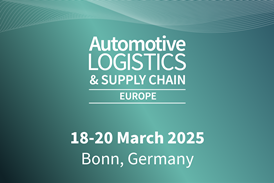









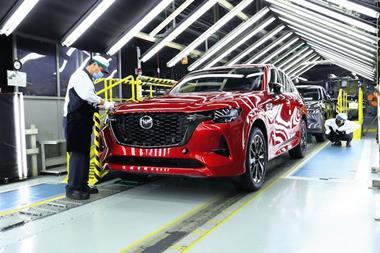


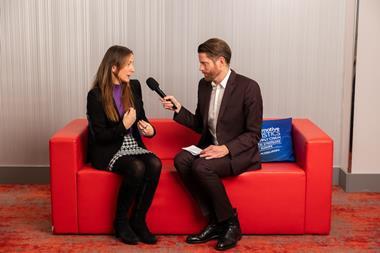


No comments yet